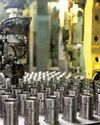STEEL SECRETARY Aruna Sharma and her team have been instrumental in the sector’s turnaround, despite the ongoing global turmoil. In a conversation with Suman K. Jha, Sharma talks about the growth of the sector, increasing per capita consumption, dealing with NPAs in the sector, evolution of private players in the steel sector and the challenges the sector is facing due to the ongoing trade wars. Excerpts:

The steel sector’s success in the midst of global turmoil is a story in itself. How do you look at this?
The journey has been really good... 2015 was a very bad year. In 2016, we realised that the sector requires immediate protection under the existing laws, and under existing laws, WTO does allow anti-dumping. So, that was worked out. We did all the homework, along with the Ministry of Commerce and Finance, we ensured that these orders were implemented, so that the steel sector could come out of the ICU. And once that was done, the whole gamut of issues were taken up — from raw material to consumption.
One big challenge was that we were a low-consumption country. We were consuming just around 60 kg per capita and to go from 50 to 59 kg we took seven years. Whereas the international average was 208 kg and China was 489 kg per capita.
We realised that steel was being replaced by alternative materials very fast over the last 40-50 years even though steel was very strong immediately after Independence. So, we worked for the amendment of the general financial rules to introduce the concept of lifecycle cost because you can execute the project in nearly one-third of the time if not half, and literally maintenance is negligible. So, with that, the consumption started going up and we are very happy to see that in the last two-and-a-half years, it has grown to the point of touching 70 kg.
Having taken care of the market part of it, we started focusing on the issues of the various sectors. The biggest problem was the NPAs. And then, the sets of problems with the PSUs. So, the problems of each set of team were flagged and the entire team started working towards those problems. We then discussed the issues related to the polices. We started with the National Steel Policy of 2017, in which we targeted that by 2030, we will reach 300 million tonnes.
This story is from the {{IssueName}} edition of {{MagazineName}}.
Start your 7-day Magzter GOLD free trial to access thousands of curated premium stories, and 9,000+ magazines and newspapers.
Already a subscriber ? Sign In
This story is from the {{IssueName}} edition of {{MagazineName}}.
Start your 7-day Magzter GOLD free trial to access thousands of curated premium stories, and 9,000+ magazines and newspapers.
Already a subscriber? Sign In

MEMORIES & IMPRESSIONS
Ratan Tata was an exceptional human being. He was a visionary leader, esteemed industrialist, and a humanitarian, who left an indelible mark on India and the world.

The Robotaxi Market
The robotaxi market is shaping up to be a high-stakes battleground as tech giants and automakers race to transform urban mobility.

And the Nobel Prize Goes to AI
The recent Nobel Prize T awards to AI pioneers affiliated with Google have sparked a broader conversation about Big Tech's influence on research and the limitations of traditional prize categories.

Ola Electrified
Once considered a trailblazer in India’s electric vehicle (EV) ecosystem, Bhavish Aggarwal’s Ola Electric now faces a major accountability crisis.

Sharp Slide in Industrial Output on Eve of Deepavali
India’s index of industrial production (IIP) saw a sharp reversal in August, contracting by 0.1 per cent, in stark contrast to the 4.7 per cent growth in July, mostly because of significant contractions in mining and electricity generation.

Heralding the Solar Era with Sustainable Electrification
RAJEEV KASHYAP on the economics of solar power, the hurdles in scaling it, and much more

A WELL-GREASED MACHINE
The OmniBook X14 laptop runs on first-generation Snapdragon X Elite, which bets big on Al-enabled productivity and battery life, but falls short when it comes to overall experience, says Deep Majumdar

DO NOT LETA HEALTH CRISIS RUIN YOUR FINANCIAL HEALTH
For a family of four living in a metro, it is recommended to opt for a family floater health insurance plan with a sum insured of at least Rs 15-20 lakh

Disruption Ahead: Beyond Organisation Charts and Structures
ALBERT EINSTEIN FAMOUSLY said, “We cannot solve our problems with the same thinking we used when we created them.

Dr. Rahul Shivajirao Kadam: A Visionary Leader Blending Sustainability, Innovation, And Social Empowerment
We are on the stage of global warming, and these technologies not only help prevent further damage but also leave behind a better environment for future generations.